Two Nepali Street Dogs Travel 7,000 Miles to New Homes in the US
[ad_1]
If you’re anything like me, you can only stomach an injured animal story, if you know it has a happy ending. Rest assured – both of these stories have wonderful endings. The two dogs featured in this article were living on the streets of Nepal’s capital city, Kathmandu. Each had suffered a horrendous injury and endured unbelievable pain. But both dogs, through the incredible generosity and good organization of a couple of individuals and a dose of sheer good luck, ended up flying to the USA and began their lives as pampered pets in permanent homes with wonderful caring families and excellent veterinary care.
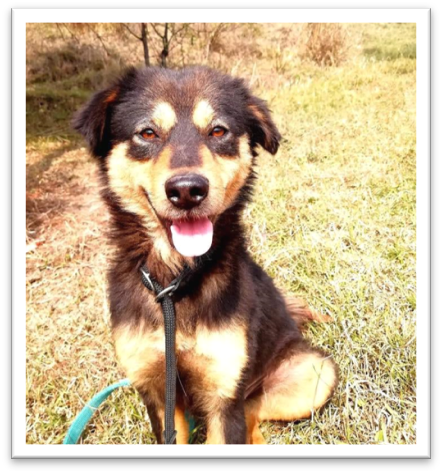
Chori is a very photogenic hound as you can see from this photo. That fact no doubt helped Johns Hopkins Health Worker, Natalie Rykiel raise $1300 for Chori’s transport to the US. Back in February of 2019, Natalie arrived at work and noticed a helpless female dog standing outside the Public Health Care Centre, in Bhaktapur, a town about an hour outside Kathmandu. Chori had a grotesque leg injury, likely from a motorcycle accident. As you can see in the photo below, her hind leg was partially severed, the skin torn off, broken bone exposed and necrosis visible. To add to her discomfort, she was infested with ticks and fleas.
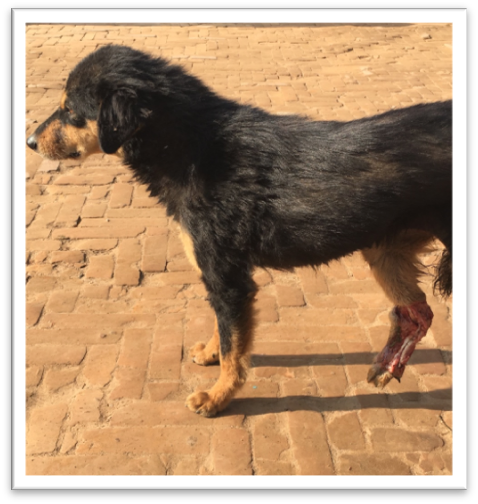
GET THE BARK IN YOUR INBOX!
Sign up for our newsletter and stay in the know.
Natalie, realized there was a very high risk of infection and the dog needed veterinary care or she would die. The Kathmandu Animal Treatment Center (KAT), founded by the late Brit Jan Salter more than two decades ago, agreed to treat the dog for free. They amputated the leg at the hip, and spayed and vaccinated her. After spending two and half months recuperating, Natalie and the staff at KAT felt she couldn’t survive back on the streets in the dog-eat-dog world; not only was she now handicapped with only 3-legs, but she had likely lost some of her street smarts having been fed and cared for daily.
Natalie connected with an oddly-named group on Facebook: ‘Don’t Panic Nepali Dogs, we’ll find you a home.’ Together, they started fundraising for the dog’s transportation and arranging foster care in the interim. They named her ‘Chori,’ literally meaning daughter but also a general Nepali term of endearment. Within 24 hours of sharing it with her friends and family, Natalie had raised over $1,300, a New York shelter ‘Second Chance’ had agreed to find the dog a permanent home, and an expat in Kathmandu called Monica had stepped up to provide a foster home.
Monica, like the rest of us who saw this story, was touched by the resilience of a dog who was walking around with a mangled leg. Despite having only one back leg, Monica noticed that Chori was amazingly agile and managed an almost normal gait. She bounded up the stairs in Monica’s home without skipping a beat and easily struck up a friendship with Monica’s resident poodle. They ran around the garden, napped together, rough-housed and even kept each other company in the kitchen at night. In the four weeks Chori stayed with Monica, she thrived no doubt benefitting from the TLC combined with good nutrition and treatment for anaplasmosis (dog tick fever).
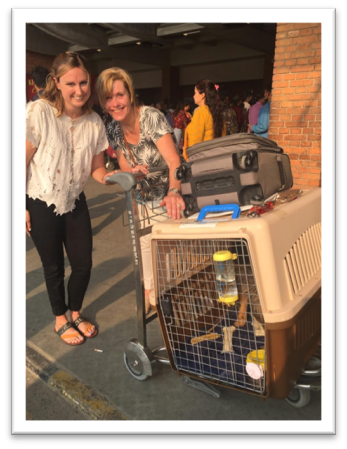
Things were really falling into place for Chori. There was just one piece missing: they needed an escort. Taking a dog as ‘excess baggage’ from Nepal to the US is relatively inexpensive – around $350 for a 40lb dog. But this only works if you have a passenger linked to the dog’s transportation. Without the passenger, the dog is shipped – in the same manner and maybe on the same plane as excess baggage – but is classified as cargo at a significantly higher cost. A 40lb dog can cost around $2,000 to travel from Kathmandu to an east coast US airport, including all the paperwork and veterinary fees.
I was reading Chori’s story on-line a month before I was due to travel to New York from Nepal. Normally, I would take my own dogs with me on a summer trip, but knowing that I would be spending a significant amount of time in the UK, it wasn’t possible to bring them along. My excess baggage allowance was ‘up for grabs!’ And so I became the last piece of the puzzle in Chori’s rags to riches story – I would escort her on my ticket.
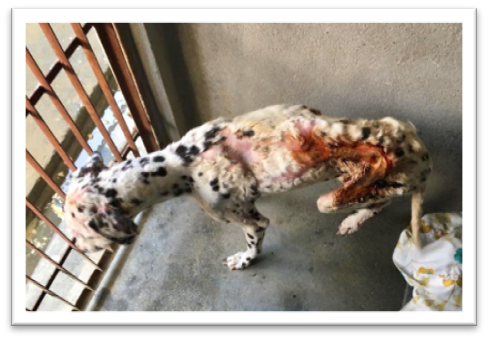
This wasn’t my first involvement shipping a Nepali dog to the US: one year earlier, I had been involved in the rescue of Keti, a Dalmatian, who had clearly once been someone’s expensive pet. Not only was she a purebred but she knew certain behaviors like retrieving a tennis ball. At some point, however, she was abused and had had battery acid thrown on her back and hind legs. Along her back was a splash pattern of missing fur and where the acid had made the first and largest point of contact, the acid had eaten away through fur, skin and muscle. The wound, as with Chori’s, was so horrendous it was sickening to look at. Again, KAT’s vets had treated the dog for free, trying to contain the infection and to relieve pain through morphine. She was painfully thin, the wound was gaping, and she held her one injured hind leg tucked against her torso like a wing, the result of the muscles being tightened and unable to extend the leg.
After seeing Keti in such a pathetic state in her cage at KAT, I knew her best chance at getting the specialized veterinary care she needed as well as ultimately being adopted, lay in getting her to the US. I resolved to find a Good Samaritan who would care for the dog and pay what would prove to be daunting veterinary bills. While the search was ongoing, I fostered Keti. I knew I could continue to clean the wound as KAT technicians were doing, but additionally I could offer her a clean and loving environment and a more nutritious diet. A dietician friend had advised me that a severe burn causes a prolonged hypermetabolic state, and the body needs a significant quantity of carbohydrates to provide energy for the healing process and extra protein for the rebuilding of damaged muscle and other tissue. On her homemade diet of eggs, chicken, brown rice and assorted vegetables, Keti began to gain weight slowly.
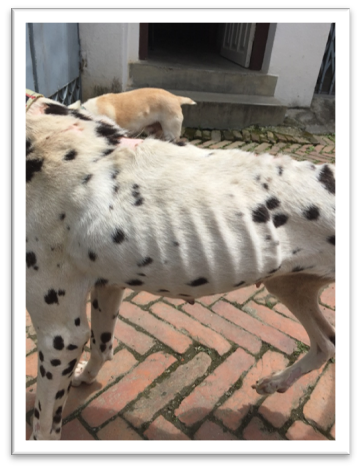
In June, I got the email I had hoped for: Jessica Herbert in Salem, Massachusetts was willing to adopt this broken dog. She asked me to suggest a name that connected the dog with Kathmandu and together we came up with Keti, meaning small girl in Nepali.
While the stress of the interminable journey was not ideal for a dog in a weakened condition, Jessica and I made the decision to send Keti to the US. As we did not have a passenger able to act as an escort, Keti was flown as cargo. We spent an anxious weekend waiting to get news of her progress: it was a long trip confined to a pet carrier in the luggage compartment of the plane but finally, on September 9th, 2018, Jessica picked up Keti at Boston airport and took her home. She was timid at first being exposed to a whole new world and a new carer, but a treat of boiled chicken livers soon won her over!

After her first veterinary check-up, Keti was found to be suffering ehrlichiosis, a tick-borne disease. After that was treated, Dr. Powers, a vet specializing in soft tissue reconstructive surgery, was able to perform a wound debridement and scar tissue excision, which released the atrophied muscle in the hip area allowing the damaged leg to drop down to the floor. Not only did the disabled leg become fully functioning and Keti was once again walking on all four legs, but the hideously disfigured leg now had nothing more than a very tidy, bald patch and a surgical scar.

I maintain contact with Jessica while feeling no untold amount of guilt over the fact that the costs of shipping Keti and her veterinary care have reached five figures! Jessica admits had she known the full cost of adopting Keti, she would have thought twice but now she wouldn’t trade her for the world. Perhaps one of the most heartening moments in this story came when Jessica sent me the photo below of Keti; her injured leg fully extended, her head held high, her body filled out to a healthy 44 pounds and sporting a most fetching winter sweater!
Chori’s story had a similarly happy ending: She was adopted by Hilary Krishnan, a creative producer at an ad agency in Brooklyn. Hilary was no stranger to pets with missing parts: she already had a one-eyed cat named Lucky who teases Chori into chasing her. Hilary takes Chori to her dog-friendly workplace every day, and she is a welcome member of a tripod dog play group in Brooklyn.
Although I had been part of the chain that made it happen for Chori to live this top-dog life, Hilary and I did not know of each other until I started to write this article. I reached out to her wanting to know what impact this adoption had made on Hilary’s life. Hilary replied that she felt privileged to be connected to such compassionate people who saved Chori and helped her along her journey.

It’s true I am glad I played a part in enabling these two dogs’ journeys to the US. It’s great to read about Chori running tight circles at the dog park or Keti’s escapades with Jessica’s 24-year-old cockatoo. But I feel some anguish too. The fact is that the sheer good fortune that befell these two dogs is not a sustainable solution to dealing with the huge number of injured street dogs in Kathmandu.
As Pramada Shah, President of Animal Nepal, notes the money spent on sending dogs to developed countries could accomplish so much if it were invested in helping animal organizations in Nepal. Pramada is quick to point out that she doesn’t have a problem with someone in the US wanting to adopt a dog from Nepal and paying for it. However, she does wish the various groups that raise money to ship a dog overseas, would also consider giving something back to helping the thousands of needy dogs back in Nepal who will never have that lucky break.
Clearly, it is not feasible to try and ship every hard luck story dog to a new life in a developed country. As one guest at a recent dinner party asked rather wryly, “Don’t they already have dogs in the US?” Not only do they have dogs, but many of the shelters are so overrun with strays that they are forced to euthanize those they deem hard to adopt whether because of an aggressive personality, or a physical disability, or just old age. And, in Nepal, where there are an estimated 20,000 + street dogs, spending $500-2,000 to fly out one dog is hard to justify. This money could be well spent funding spay and neuter campaigns such as KAT and Animal Nepal provide and perhaps to further devote resources to educating people on the benefits of dogs as companions, regardless of breed, and how to care for them.
Some expats have suggested that Nepalis only want pedigree dogs (sometimes not even caring properly for these expensive investments) and therefore no street dogs have a reasonable chance at being adopted. Pramada disagrees. She says the number of calls from Nepalis to report an injured dog in their neighborhood has increased dramatically in the last few years. And Nepali families are slowly coming around to the idea not only of having a dog who is a companion rather than a guard dog, but also to the idea that this could be a mixed breed, native-born hound!
Do I regret what happened to Chori and Keti? No. I would have to say I felt that these two dogs had gone through extreme suffering and they did not have good prospects if they remained in Nepal. Neither dog would have been easy to place in permanent good homes due to their scarring. And putting them back on the streets of Kathmandu would have been ill-fated: Chori would have had difficulty as an amputee fending for herself and Keti’s gaping wound would have eventually become infected. I felt these two deserved the opportunity to get top notch veterinary care and to escape the harsh life of a street dog in Kathmandu, scavenging for food, fighting for territory, enduring fleas, diseases and sometimes injuries from car accidents or dog bites. They deserved to live with a family in a permanent and wonderful home in the US.
Reflecting on her brief time fostering Chori, Monica wrote that she was pondering whether Chori (or Keti) had the capacity to realize they had been rescued? To appreciate that they will never again know the pain that they both felt and the tough, lonely life as a street dog in Kathmandu. “I still find myself wondering if dogs can ‘look back’ on their lives B.U.S.A?” she muses. Do dogs have any capacity to appreciate that they are well fed, cared for and safe? If not, at least the humans involved in their rescue and re-homing, can rejoice in the transformation.
[ad_2]
Source link




Thank you for great content. Hello Administ. Metropol Halı Karaca Halı Öztekin ve Selçuklu Halı Cami Halısı ve Cami Halıları Türkiye’nin En Büyük Cami Halısı Fabrikasıyız…
budesonide price in india
darknet seiten dark web site
dark web links dark web market
deep web drug store deep web drug markets
Lorsque nous soupçonnons que notre femme ou notre mari a trahi le mariage, mais qu’il n’y a aucune preuve directe, ou que nous voulons nous inquiéter de la sécurité de nos enfants, surveiller leurs téléphones portables est également une bonne solution, vous permettant généralement d’obtenir des informations plus importantes..
You suggested that well!
how to write a controversial essay write an essay for me thesis writing services
Wow a lot of beneficial facts.
the borgata casino online fastest payout online casino what is the best online casino game
Reliable knowledge. Thanks a lot!
online casino roulett top online casino agen judi casino maxbet online
Lovely forum posts. Kudos!
online casino games bonus casinos online online casino instant withdrawal uk
Nicely put. Thanks a lot!
casino online ruleta best online casino welcome bonus no deposit online betting live casino
You explained this fantastically.
online casino karamba casino online games free wizard of oz casino game online
This is nicely put! !
casino online latvia online casino list online hry casino automaty
Thank you. Great stuff.
caesars palace online casino ontario online casino bonus no online casinos that give birthday bonuses
Cheers! Excellent stuff.
apuestas casino online colombia best online casino reddit no deposit bonus shazam online casino
Nicely put, Many thanks!
belterra casino online no deposit online casino bonus hollywood casino free online slot play
You’ve made your point quite effectively..
online casino games like luckyland slots no deposit online casino casinos online que aceptan paysafecard
Nicely put. Cheers.
best online casino games to make money us online casino pala casino online new jersey
Superb content. Regards!
online casino free bonus codes casino online free neverland casino online slots real money
Cheers, Helpful stuff!
online casino crypto brand new online casinos usa no deposit bonus online video poker casinos
Awesome posts, Thank you!
free online casino bets new online casino usa online casinos italy
Thank you, Valuable information.
online casino signup bonus online casino bonuses 123 casino online
Nicely spoken of course. .
online casino free spins no deposit australia online casino top rated all online casino list
Thanks a lot! Quite a lot of postings!
online casinos that accept prepaid visa cards online casino bonus tortuga online casino
You actually expressed it exceptionally well.
nyeste online casino casino online no deposit bonus uk casinos online
Nicely voiced genuinely! !
all new online casinos accepting south africa legit online casino top online casinos jamaica
Wonderful facts, Thanks!
online casino hosting online us casinos live dealer baccarat online casino
Wonderful posts. Many thanks.
bovada online casino login free online games casino jb online casino
Great information, Many thanks.
are all online casino’s owned by the same company online casino list andar bahar online casinos
Nicely put, Kudos.
gta 5 online casino can’t buy chips online casino bonus new usa online casinos no deposit
You have made your stand pretty nicely.!
free online casinos with no deposit bonus no deposit online casino usa new us online casinos 2021
Fantastic posts, Thank you.
gratis online casino games best casinos online winpot casino online
You said it adequately..
atlantic casino club online no deposit online casino casino online 10 euro gratis
Many thanks! I appreciate it.
paypal deposit online casino online casino deposit bonus connecticut casino online
Nicely put, Appreciate it.
m777 casino online best online casino no deposit sign up bonus best online casino app
Regards, Quite a lot of write ups!
what online casino has the best payouts best online casino bonuses best online casino nj reviews
Kudos. I appreciate this!
bandar casino sbc168 online online casino gambling bank of america online casino
With thanks, I like this.
new wv online casinos casinos online usa turtle creek online casino
Whoa a lot of excellent information!
casinos online con dinero real online gambling casino emerald casino online
Kudos. Valuable information!
gta online stuck in casino loading screen usa online casino grand palace casino online
Cheers, I like this!
betamerica online casino nj brand new online casinos usa no deposit bonus online casino adventskalender
You actually stated that really well.
latest online casinos australia online casino casino online que aceptan paypal
Cheers. Quite a lot of stuff.
platinum casino online new online casino no deposit bonus usa casino france online shopping
You actually said it very well.
twinspires casino online casinos online usa bandar taruhan casino joker123 online
Cheers! I value it!
jackpot party casino game online online casinos crypto online casino
Regards! Valuable information.
can you play online casino in arizona social casinos online online casino neteller deposit
Whoa tons of terrific info.
best recommended casino online mobile australia real money fast withdrawal casino online bonus oaklawn online casino
Regards! Loads of advice.
play real casino games online for free fastest payout online casino cryptocurrency casino online
Nicely put, Cheers!
win real money online casino united states https://mapcasino.info/review-xbet/ best casino online 2017
equilibrado estatico
Sistemas de equilibrado: esencial para el operacion uniforme y eficiente de las maquinarias.
En el ambito de la tecnologia actual, donde la rendimiento y la estabilidad del dispositivo son de alta trascendencia, los aparatos de equilibrado desempenan un funcion esencial. Estos sistemas adaptados estan desarrollados para ajustar y fijar piezas rotativas, ya sea en maquinaria industrial, transportes de movilidad o incluso en dispositivos de uso diario.
Para los especialistas en soporte de equipos y los ingenieros, operar con aparatos de ajuste es esencial para promover el desempeno uniforme y fiable de cualquier sistema movil. Gracias a estas herramientas tecnologicas innovadoras, es posible disminuir notablemente las sacudidas, el ruido y la tension sobre los sujeciones, prolongando la vida util de componentes costosos.
Igualmente significativo es el papel que juegan los dispositivos de equilibrado en la servicio al comprador. El soporte especializado y el reparacion regular utilizando estos equipos facilitan brindar soluciones de excelente estandar, mejorando la satisfaccion de los clientes.
Para los titulares de empresas, la contribucion en unidades de balanceo y dispositivos puede ser esencial para mejorar la rendimiento y desempeno de sus sistemas. Esto es particularmente significativo para los inversores que dirigen pequenas y medianas emprendimientos, donde cada aspecto vale.
Por otro lado, los dispositivos de calibracion tienen una vasta uso en el sector de la fiabilidad y el monitoreo de estandar. Posibilitan detectar potenciales defectos, previniendo reparaciones onerosas y perjuicios a los aparatos. Incluso, los resultados extraidos de estos aparatos pueden utilizarse para optimizar metodos y potenciar la presencia en buscadores de exploracion.
Las areas de utilizacion de los sistemas de ajuste abarcan diversas areas, desde la manufactura de transporte personal hasta el control de la naturaleza. No importa si se trata de importantes fabricaciones industriales o reducidos locales domesticos, los equipos de ajuste son necesarios para proteger un funcionamiento optimo y sin fallos.